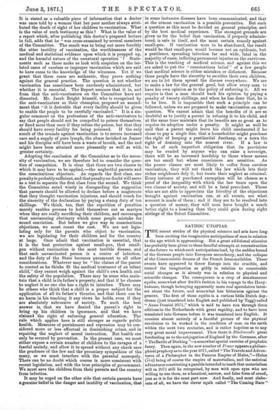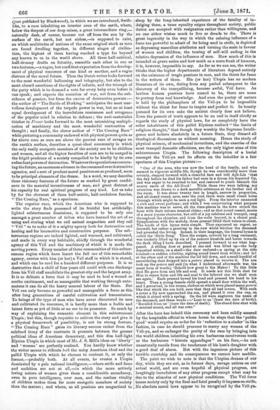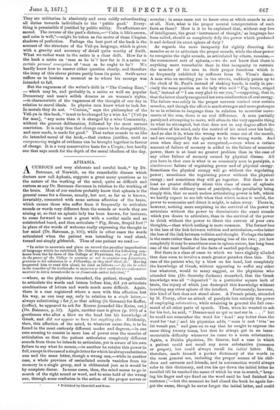SATIRIC UTOPIAS.
THE recent strides of the physical sciences and arts have long been exciting the imaginative anticipations of men in relation to the age which is approaching. But a great additional stimulus has probably been given to those fanciful attempts at reconstruction of the future to which such anticipations lead, by the sudden bound of the German people into European ascendancy, and the collapse of the Communistic dreams of the French Irreconcilables. These events have appeared to throw Europe into the crucible, and turned the imagination as giddy in relation to conceivable social changes as it already was in relation to physical and scientific changes. The consequence is a crop of simultaneous squibs, somewhat after Swift's fashion in his voyage to the limy- hnhnms, though betraying apparently more real speculative inter- est about the future, and somewhat less bitterness against the present. The first of these squibs is a curious little Dutch day- dream (just translated into English and published by Tegg) called " Anno Domini 2071," which is said to have run through three editions in the Netherlands with great rapidity, and to have been translated into German before it was translated into English. It consists almost entirely of a fanciful picture of the physical revolution to be worked in the condition of man on the earth within the next two centuries, and is rather hopeless as to any very great moral improvement. Then there is Blackwood's great foreboding as to the subjugation of England by the Germans, after " TheBattle of Dorking "—a somewhat special exercise of prophetic fancy. Then again, in the new number of Fraser appears a philoso- phical prophecy as to the year 2071, called "The Travels and Adven- tures of a Philosopher in the Famous Empire of Hulee,"—Hulee (i) being of course the empire of materialism, and the satirical adventures constituting a parable intended to teach that materialism will in 2071 still be recognized, by men with open eyes who are willing to use them, as a fanatical, narrow, and false form of creed, just as it is for the most part now. And finally, and most elabo- rate of all, we have the clever squib called "The Coming Race"
(just published by Blackwood), in which we are introduced, Swift- like, to a race inhabiting an interior zone of the earth, where,
below the deepest of our deep mines, a great intermediate ring,— naturally dark, of course, because cut off from the sun by the surface of the earth, but not airless,—is supposed to exist, on which multitudes of nations of the same original stock as man are found dwelling together, in different stages of civiliza- tion, the highest of them having reached a type far beyond any known to us in the world above. All these half-satirical, half-dreamy drafts on futurity, resemble each other in one or two features,-1 vague, but confident expectation from the develop- ment of physical resources of one kind or another, and a vague distrust of the moral future. Thus the Dutch writer looks forward to the most wonderful ballooning and telegraphy, but also to the most absurd assertions of the rights of infants, and the triumph of the party which is to demand a vote for every baby even before it can speak ; and expects the cessation of war, not from the sub- sidence of passion, but from the excess of destructive powers :— the author of "The Battle of Dorking" anticipates the most mar- vellous development of the torpedo power in war, but an at least equal development of the incredulous remissness and arrogance .of the popular mind in relation to defence ; the anti-materialist thinker in Fraser looks forward to the most astonishing multipli- cation of machinery and the most, wonderful contraction of thought ; and finally, the clever author of "The Coming Race" while picturing a community endowed with physical powers quite as far above ours as ours are above the poorest race of savages on the earth's surface, describes a quasi-ideal community in which the only really energetic members of the society are to be children and women, and all the higher faculties of men are to be merged in the frigid prudence of a society compelled to be kindly by its own reduudantpowersof destruction. Whatever thespeculationsconcern- ing the future, an enormous advance in the command over destructive agencies, and a sort of prudent moral passiveness so produced, seem to be principal elements of the dream. In a word,. we may describe these visionary features of the future as marked by great confid- ence in the material inventiveness of man, and great distrust of his capacity for real spiritual progress of any kind. Let us take by far the cleverest of these half-satiric, hall-credulous fancies, "The Coming Race," as a specimen.
The superior race, which the American who is supposed to write the story finds possessed of its fruitful but artificially- lighted subterranean dominions, is supposed to be only one amongst a great number of tribes who have learned the art of so using and storing what we call animal magnetism and they call " Vril " as to make of it a mighty agency both for destructive and healing and for locomotive and constructive purposes. The sub- terranean regions are indeed lighted, and warmed, and cultivated, -and made in every way habitable, chiefly through the wonderful agency of this Vril and the machinery of which it is made the moving power. Every member of those communities of this subter- ranean region which have learnt the full use of this remarkable agency, carries with him (or her) a Vril staff in which it is stored, and which can be used for a hundred different purposes. It is so destructive that a child of four years old could with one discharge from his Vril staff annihilate the greatest city and the largest army. It is so delicate a force that it may be used to heal a wound or soothe excitement, and so manageable that working through auto- matons it can do all the heavy manual labour of the State. But Vril can only become so powerful and manageable a force as this after long generations of careful cultivation and transmission. To beings of the type of man who have never discovered its uses and cultivated its resources, it is hardly more than a feeble and latent force as yet of little or no use to its possessor. So much by way of explaining the romantic element in this subterranean Utopia ; but this, though requisite to enliven the story and give it a physical framework of possibility, is not its strong feature. "The Coming Race" gains its literary success rather from the subdued irony of the contrasts it presents between the grosser political ideas of American democracy, and this dim half-light Elysian Utopia in which most of Mr. J. S. Mill's ideas on ' liberty ' and woman' are perfectly realized. You hardly know whether the writer means to ridicule both the noisy American ideal and the pallid Utopia with which he chooses to contrast it, or only the former,—probably both. At all events, he creates a Utopia dominated by a pale rational intelligence,—where strife and fame and ambition are not at all,—in which the more actively loving nature of women gives them a considerable ascendancy, even in pure intelligence, over men, and the restless vitality of children makes them far more energetic members of society than the mature ; and where, as all passions are magnetized to
sleep by the long-inherited experience of the fatality of in- dulging them, a tame equality reigns throughout society, public duties are accepted with resignation rather than willingness, and no one either wishes much to live or dreads to die. There is great ingenuity in the way in which the calming influence of a force too powerful to admit of its being used in strife, is depicted as depressing masculine attributes and turning the scale in favour of women and children, the taming of self-will ending in the relative depression of the influence of men. How much of this is intended as grave satire and how much as a mere freak of humour, it is, however, impossible to say. As far as we can see, the writer thinks that the higher departments of literature depend entirely on the existence of tragic passions in men, and the thirst for fame in the writers of them. His (or her) Utopia has no modern literature of its own, dating from any period subsequent to the discovery of the tranquillizing, because awful, Vril force. As lawless human passions have ceased to be, there are none to portray from real knowledge. And even the poetry of nature is held by the philosophers of the Vril-ya to be impossible without the thirst for fame to inspire and perfect it. In beauty pursued for its own sake the satirist clearly does not believe.
Even the pursuit of truth appears to be an end in itself chiefly as regards the study of physical laws, for so completely have the sober inhabitants of this pallid Elysium realized "the limits of religious thought," that though they worship the Supreme Intelli- gence and believe absolutely in a future State, they discard all theological discussions as without meaning. Hence the study of physical science, of mechanical inventions, and the exercise of the most tranquil domestic affections, are the only higher aims of this subterranean Utopia. The following description of a burial amongst the Vril-ya and its effects on the beholder is a fair specimen of this Utopian picture:—
" One of the sons, 'who was now the head of the family, and who seemed in vigorous middle life, though he was considerably more than seventy, stepped forward with a cheerful face and told Aph-Lin that the day before he died his father had seen in a dream his departed Gy, and was eager to be reunited to her, and restored to youth beneath the nearer smile of the All-Good.' While these two were talking, my attention was drawn to a dark metallic substance at the farther end of the room. It was about twenty feet in length, narrow in proportion, and all closed round, save, near the roof, there were small round holes through which might be seen a red light. From the interior emanated a rich and sweet perfume ; and while I was conjecturing what purpose this machine was to serve, all the time-pieces in the town struck the hour with their solemn musical chime ; and as that sound ceased, music of a more joyous character, but still of a joy subdued and tranquil, rang throughout the chamber, and from the walls beyond, in a choral peal. Symphonious with the melody, those present lifted their voices in chant. The words of this hymn were simple. They expressed no regret, no farewell, but rather a greeting to the new world whither the deceased had preceded the living. Indeed, in their language, the funeral hymn is called the 'Birth Song.' Then the corpse, covered by a long cerement, was tenderly lifted up by six of the nearest kinsfolk and borne towards the dark thing I have described. I pressed forward to see what hap-. paned. A sliding door or panel at one end was lifted up—the body deposited within, on a shelf—the door reclosed—a spring at the side touched—a sudden whishing, sighing sound heard from within ; and lo! at the other end of the machine the lid fell down, and a small handful of smouldering dust dropped into a patera placed to receive it. The son took up the patera and said (in what I understood afterwards was the usual form of words), 'Behold how great is the Maker ! To this little dust He gave form and life and soul. It needs not this little dust for Him to renew form and life and soul to the beloved one we shall soon see again.' Each present bowed his head and pressed his hand to his heart. Then a young female child opened a small door within the wall, and I perceived, in the recess, shelves on which were placed many paterce like that which the son held, save that they all had covers. With such a cover a Gy now approached the son, and placed it over the cup, on which it closed with a spring. On the lid were engraven the name of
the deceased, and these words Lent to us' (here the date of birth). 'Recalled from us' (here the date of death). The closed door shut with a musical sound, and all was over."
After the hero has beheld this ceremony and been mildly assured
by the hospitable official in whose house he stays that the 'public good' would require an order for his redaction to a cinder' in like
fashion, in case he should presume to marry any woman of the Vril-ya, and so endanger the purity of the race by bringing into the world children inheriting his own barbarous carnivorous teeth or the barbarous "hirsute appendages" on his face,—he not unnaturally recoils from the tenderness of his host's daughter with a good deal of alarm. But with the ingenious picture of this terrible courtship and its consequences we cannot here meddle.
The point we wish to note is that the Utopian dreams of our day, while they are not, as in former days, savage satires on our actual world, and are even hopeful of physical progress, are laughingly incredulous of any other progress except what may be due to the stimulus of new physical conditions. The Vril force tames society only by the final and fatal penalty it imposes on strife. No absolute moral laws appear to be recognized by the Vril-ya.
They are utilitarian in absolutely and even coldly subordinating all duties towards individuals to the 'public good.' Every- thing is permissible if justified by public utility. No affections are sacred. The reverse of the poet's dictum,—" Calm is life's crown, and calm is well,"—might be taken as the motto of these Utopian shadows of perfection. Perhaps the best part of the book is the account of the structure of the Vril-ya language, which is given with a gravity and accuracy of detail quite worthy of Swift. 'What we rather want in the satire is a clear drift. How far is the book a satire on man as he is'? how far is it a satire on certain persons' conception of man as he ought to be'? We hardly know how to answer either question clearly, and therefore the irony of this clever picture partly loses its point. Swift never suffers us to hesitate a moment as to where his scourge was intended to fall.
But the vagueness of the writer's drift in "The Coming Race," — which may be, and probably is, a satire as well on popular Democracy and man's selfish dreams as on woman's rights, —is characteristic of the vagueness of the thought of our day in relation to moral ideals. In physics men know what to look for. In morals they do not. "Custom," says the philosopher of the Vril-ya in this book, "is not to be changed by a wise An" [Vril-ya for man], "any more than it is changed by a wise Community, without the gravest deliberation, followed by the most earnest conviction. It is only thus that change ceases to be changeability, and once made, is made for good." That rather sounds to us like the intended moral of the book,—that custom justifies, until an overpowering weight of evidence can be brought together in favour of change. It is a very conservative basis for a Utopia ; but hardly one that says much for the depth of the moral idealism of the day.




































 Previous page
Previous page